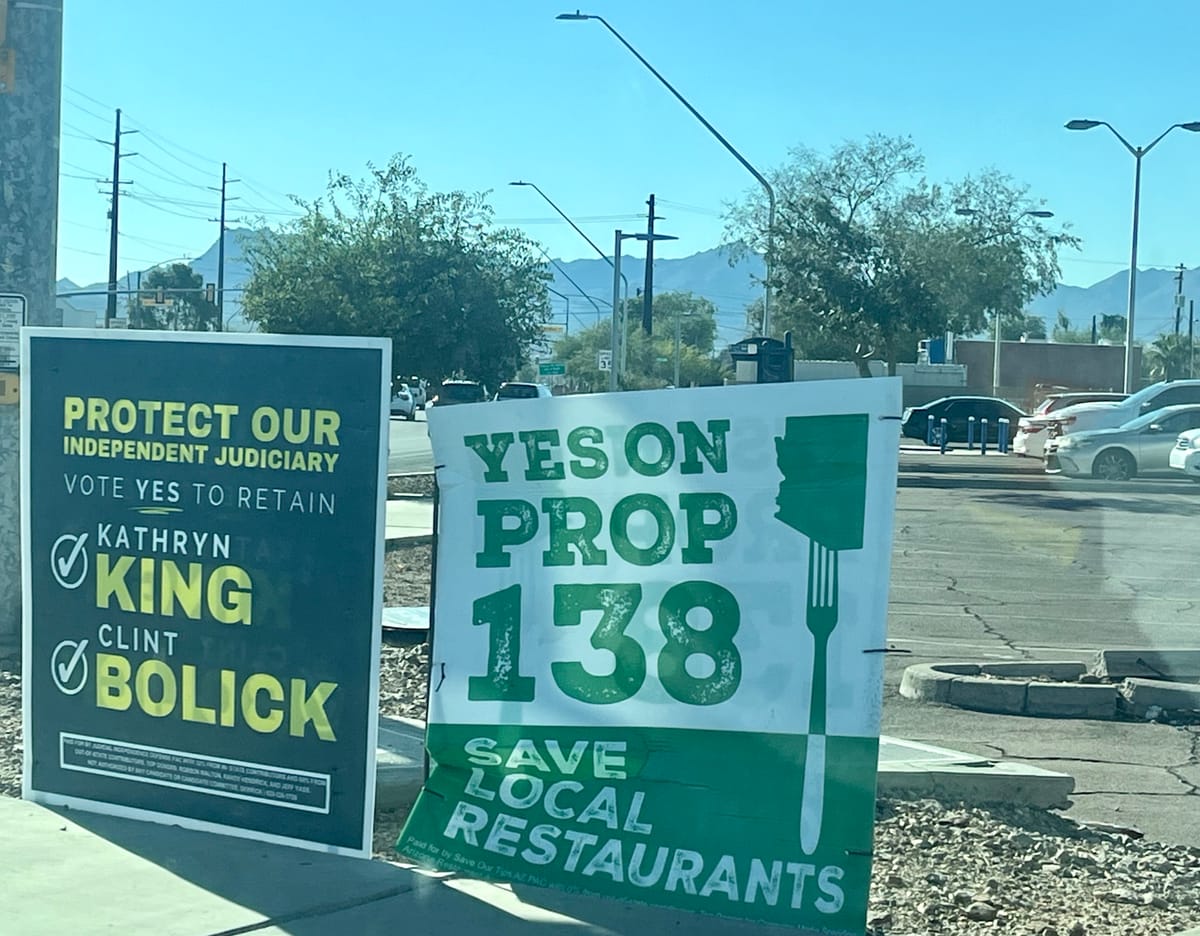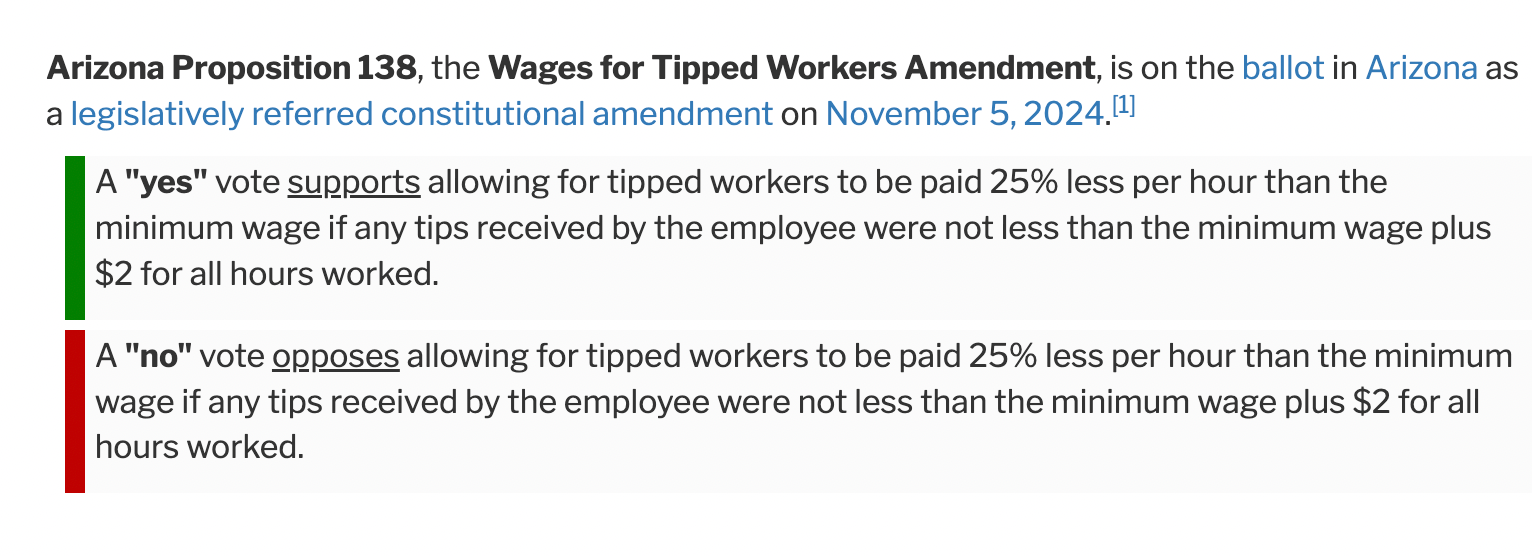Ballot prop could reshape comp for waiters, bartenders, baristas
If you’ve driven around Tucson over the past few weeks, you may have noticed signs encouraging voters to approve Proposition 138 to save local restaurants.

This year’s ballot includes a daunting 13 statewide propositions, with most of the buzz surrounding those addressing abortion and immigration.
But if you’ve driven around Tucson over the past few weeks, you may have noticed signs encouraging voters to approve Proposition 138 to save local restaurants.
Prop 138, referred to as the Tipped Workers Protection Act, could reshape compensation for servers, bartenders, baristas and others. The proposition would allow businesses to pay their tipped employees 25% less than the state minimum wage, as long as the employees’ total earnings including tips are at least $2 more.
Currently, employers can pay their tipped workers $3 less per hour than minimum wage, provided their tips make up the difference. Minimum wage is $14.35 per hour, but will increase to $14.70 per hour next year.
If Prop 138 passes, employers could pay their tipped workers $11.03 per hour, as long as the employee’s hourly pay with tips is at least $16.70 per hour. That’s slightly less than the current $11.35 per hour employers are currently required to pay.
Prop 138 was created in response to the One Fair Wage Effort, a national campaign to raise the minimum wage in Arizona to $18 per hour and eliminate the tip credit. Prop 138 was an effort to push back on the second piece and enshrine the tip credit in the state constitution, but One Fair Wage ended up being pulled from the ballot.
Prop 138 has received strong statewide support from the Arizona Restaurant Association, and locally, it’s backed by restaurant owners and the Tucson Metro Chamber.
“The Tipped Worker Protection Act is kind of a unicorn,” said Zach Yentzer, the chamber’s vice president of business advocacy. “It helps the operator on the margin side but also ensures that the tip credit gives workers $2 more than minimum wage.”
Yentzer said Prop. 138 protects workers’ ability to earn a living wage and that the only way service workers can earn that living wage is by protecting the tip credit. It also guarantees that regardless of tips, workers will receive at least $16.70 per hour, a higher guaranteed rate then they currently receive.
“The servers I’ve talked to have said ‘Please don’t touch my tips. If they take away the tip credit and force my employer to move to a tip pool, I’ll make less than I am now,’” Yentzer said. “This is about the workers, instead of just the business owners.”

Corporate restaurants will be fine regardless of an increase in wages, since they have wider profit margins that allow for higher labor costs, Yentzer said.
“It’s the local food businesses that are the tapestry of Tucson that are at the most risk when seemingly good ideas like Raise the Wage and eliminating tip credits happen,” he said. “Restaurant owners already hold their breath from May to September every year in Tucson when business dries up. They’re either going to raise costs or shut down.”
Yentzer said he’s been on both sides of the situation, working as a barista at Savaya Coffee before moving up to become director of operations for the company.
“I went from being a barista working for tips to looking at profit and loss statements every month,” he said. “I got to see the total amount of staff cost as it relates to the total budget of the restaurant. The margins are so slim.”
Yentzer said the chamber has spoken with local restaurant owners who say they will keep base pay at $11.35 regardless of whetherProp. 138 passes, and that both restaurateurs and tipped workers see the protection not so much as the base pay, but the ability to earn several times the minimum wage through tips..
Alexis Reinacher, a bartender at Union Public House, has worked in the restaurant industry for 14 years. She supports the measure, saying it could help ease financial strain on small business owners while still ensuring that workers earn fair wages.
"I get that a 25% drop in hourly wages sounds scary," Alexis said, "But many tipped workers understand that we make up the difference in tips."
She added that Prop. 138 would act as a safety net by ensuring workers earn at least $2 above the minimum wage and said she hoped lower labor costs would translate into reduced menu prices.
Gracie Kayko, a University of Arizona student and bartender, said tips at her restaurant are divided equally among bartenders, but also shared with the hostess and cooks. She said that on particularly slow days, she appreciates having her hourly wage to rely on.
“As a server, I would like to keep our current minimum wage, if not (make it) higher, especially in the summer months when it's slow,” Kayko said.
Another UA student, Sam Parker, expressed concern about how tips contribute to workers' financial stability.
"I don't know how much they are depending on my tip to pay rent,” Parker said. “I just wish I knew if they were getting fair pay, especially in places where you do most of the work yourself."
Kayko also mentioned the recent influx of fast casual and self-serve restaurants, saying they present an awkward situation when it comes time to pay.
“If I’m going to a frozen yogurt place where I’m pouring my own yogurt and putting my own toppings on, and then it says ‘Tip,’ I’m like, ‘For what?’” she said.
While servers like Reinacher, who said that she makes between $25 and $30 on most days, won’t notice a difference in pay if Prop. 138 passes, workers at other types of establishments could.
And maybe for the better.
“If I'm ordering a black coffee, I'm not going to tip because I know all you have to do is pull a lever,” Kayko said.
One concern for critics is the potential loss of local control over wage standards. Since Prop 138 would enshrine the tip credit into the state constitution, this would prevent cities from setting higher minimum wage standards to keep up with the cost of living.
In 2021, Tucson voters approved Proposition 206, which raised the city’s minimum wage to $15 by 2025, with annual increases tied to inflation. The law includes protections for workers, such as penalties for employers who retaliate against complaints.
But opponents say that if Prop 138 passes, it could override Tucson’s local wage increases, capping the minimum wage statewide and blocking further efforts to raise wages.
“Every year when the minimum wage goes up, employers can pay tipped workers less than they would under the current law,” Tucson Mayor Regina Romero said in an Instagram post, encouraging followers to vote “no” on Prop. 138. “ Wage theft.”
Opponents also argue that Prop 138 could have devastating effects on tipped workers, particularly those who depend on a stable hourly wage during slow periods and that it's simply the latest effort by the National Restaurant Association to keep wages low.
“The National Restaurant Association's claim that restaurants cannot afford to pay livable wages indicates a flawed and unsustainable business model. Relying on worker exploitation as a solution only perpetuates the problem and shifts the burden onto customers and taxpayers,” Jessica Staggers, community engagement strategist for Maricopa County Young Democrats, wrote in her argument against the initiative. “Holding companies accountable and promoting fair treatment of employees is essential for a just and equitable society. We must prioritize the rights and needs of workers, ensuring that they receive the compensation and respect they deserve.”



